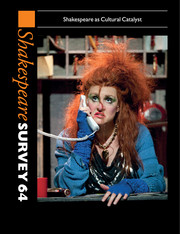Book contents
- Frontmatter
- CONTENTS
- ILLUSTRATIONS
- The Commercial Bard: Business Models for the Twenty-First Century
- International Innovation? Shakespeare as Intercultural Catalyst
- Brand Shakespeare?
- Global Shakespeare 2.0 and the Task of the Performance Archive
- An International Database of Shakespeare on Film, Television and Radio
- ‘Sounds and Sweet Airs’: Music in Shakespearian Performance History
- Using Shakespeare with Memes, Remixes and Fanfic
- ‘Pretty Much how the Internet Works’; or, Aiding and Abetting the Deprofessionalization of Shakespeare Studies
- Catalysing What? Historical Remediation, the Musical, and What of Love's Labour's Lasts
- Kabuki Twelfth Night and Kyogen Richard III: Shakespeare as a Cultural Catalyst
- The Sonnets as an Open-Source Initiative
- ‘A Stage of the Mind’: Hamlet on Post-War British Radio
- Post-Textual Shakespeare
- I am What I am Not: Identifying with the Other in Othello
- Desdemona's Book, Lost and Found
- Non-Catalyst and Marginal Shakespeares in the Nineteenth-Century Revival of Catalan-Speaking Cultures
- Shakespeare, Mácha and Czech Romantic Historicism
- An Irish Catalysis: W. B. Yeats and the Uses of Shakespeare
- François-Victor Hugo and the Limits of Cultural Catalysis
- ‘You Taught me Language’: Shakespeare in India
- There is Some Soul of Good: An Action-Centred Approach to Teaching Shakespeare in Schools
- The Royal Shakespeare Company as ‘Cultural Chemist’
- Shakespeare at the White Greyhound
- Dark Matter: Shakespeare’s Foul Dens and Forests
- What We Hear; What we see: Theatre for a New Audience's 2009 Hamlet
- Narrative of Negativity: Whig Historiography and the Spectre of King James in Measure for Measure
- Québécois Shakespeare goes Global: Robert Lepage's Coriolan
- Endless Mornings on Endless Faces: Shakespeare and Philip Larkin
- Shakespeare Performances in England 2010
- Professional Shakespeare Productions in the British Isles, January–December 2009
- The Year’s Contribution to Shakespeare Studies
- INDEX
- References
An International Database of Shakespeare on Film, Television and Radio
Published online by Cambridge University Press: 28 November 2011
- Frontmatter
- CONTENTS
- ILLUSTRATIONS
- The Commercial Bard: Business Models for the Twenty-First Century
- International Innovation? Shakespeare as Intercultural Catalyst
- Brand Shakespeare?
- Global Shakespeare 2.0 and the Task of the Performance Archive
- An International Database of Shakespeare on Film, Television and Radio
- ‘Sounds and Sweet Airs’: Music in Shakespearian Performance History
- Using Shakespeare with Memes, Remixes and Fanfic
- ‘Pretty Much how the Internet Works’; or, Aiding and Abetting the Deprofessionalization of Shakespeare Studies
- Catalysing What? Historical Remediation, the Musical, and What of Love's Labour's Lasts
- Kabuki Twelfth Night and Kyogen Richard III: Shakespeare as a Cultural Catalyst
- The Sonnets as an Open-Source Initiative
- ‘A Stage of the Mind’: Hamlet on Post-War British Radio
- Post-Textual Shakespeare
- I am What I am Not: Identifying with the Other in Othello
- Desdemona's Book, Lost and Found
- Non-Catalyst and Marginal Shakespeares in the Nineteenth-Century Revival of Catalan-Speaking Cultures
- Shakespeare, Mácha and Czech Romantic Historicism
- An Irish Catalysis: W. B. Yeats and the Uses of Shakespeare
- François-Victor Hugo and the Limits of Cultural Catalysis
- ‘You Taught me Language’: Shakespeare in India
- There is Some Soul of Good: An Action-Centred Approach to Teaching Shakespeare in Schools
- The Royal Shakespeare Company as ‘Cultural Chemist’
- Shakespeare at the White Greyhound
- Dark Matter: Shakespeare’s Foul Dens and Forests
- What We Hear; What we see: Theatre for a New Audience's 2009 Hamlet
- Narrative of Negativity: Whig Historiography and the Spectre of King James in Measure for Measure
- Québécois Shakespeare goes Global: Robert Lepage's Coriolan
- Endless Mornings on Endless Faces: Shakespeare and Philip Larkin
- Shakespeare Performances in England 2010
- Professional Shakespeare Productions in the British Isles, January–December 2009
- The Year’s Contribution to Shakespeare Studies
- INDEX
- References
Summary
In 2005 The Arts and Humanities Research Council granted the British Universities Film & Video Council (BUFVC) funding to establish a three-year research project which would create An International Database of Shakespeare on Film, Television and Radio (www.bufvc.ac.uk/Shakespeare). It would employ two full-time researchers and a target was set of 4,000 titles describing films, television programmes and radio broadcasts with Shakespeare-related content. An important proviso was that archival holdings and current distribution and retail information would be cited and updated so that scholars, researchers and students would know where to go to look and to listen. The Database can be searched at no cost and with no registration formalities.
Had the BUFVC bid for money to create a database, for example, of media materials on Jane Austen, Harold Pinter or any one of Shakespeare's contemporaries it may not have been so successful. The name Shakespeare and his association with nation, culture, the national curriculum and civilisation itself has become stronger in post-colonial times. In recent years critical research into Shakespeare and popular culture, particularly by Richard Burt in his edited work Shakespeares After Shakespeare, has examined how Shakespeare is both canonized and rejected in the media – how, for example, Shakespeare, and what his work signifies, is used in advertising, popular song, television variety sketches and porn films. Believing Shakespeare the signifier to be as relevant as Shakespeare the author, the Database had to capture and reflect as many of these appropriations as it could.
- Type
- Chapter
- Information
- Shakespeare Survey , pp. 52 - 58Publisher: Cambridge University PressPrint publication year: 2011

